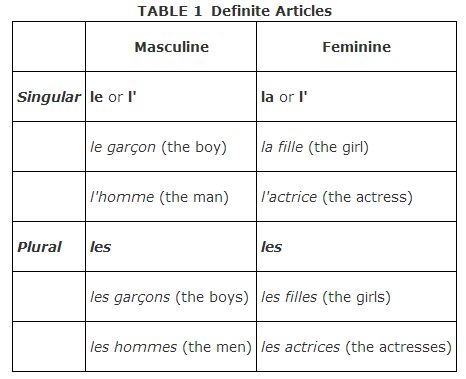The definite article, which expresses the English word “the,” indicates a specific person or thing: the family, for example. The masculine, feminine, singular, and plural forms are shown in Table 1.

For words beginning with a vowel or vowel sound (y and
unaspirated h; that is, no puff of air is emitted when pronouncing the word — aspirated h is generally indicated in dictionaries by an * or other symbol), the singular definite articles
le and
la become
l'. The masculine or feminine
gender of the noun, so easily recognizable when
le (masculine) or
la (feminine) is used, becomes a problem when the noun that follows requires the use of
l', which represents either gender noun before a vowel.
All plural nouns require the one plural definite article
(les), so you cannot determine the gender of the noun by the article.
Use the definite article as follows:
-
With nouns in a general or abstract sense
-
With names of languages, except directly after
parler,
en, and
de
-
Le français est facile. (French is easy.)
-
J'adore le français. (I love French.)
But:
-
Je parle français. (I speak French.)
-
C'est en français. (It's in French.)
-
une classe de français (a French class)
-
With parts of the body when the possessor is clear
-
With titles of rank or profession, except when addressing the person
-
le docteur Jean (Dr. John)
But:
-
Bonjour, docteur Jean. (Hello, Dr. John.)
-
With days of the week in a plural sense
-
With season and colors, except after
au or
en
But:
-
With dates
-
With most geographical names of countries and continents
-
To express a, an, or per with weights and measures
-
With common expressions of time or place